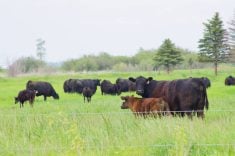LACOMBE, Alta. – Farmers in this central Alberta region fear that a land-use bylaw forcing intensive livestock operators to own all the property in a buffer zone will have province-wide implications.
The controversial amendment was passed Aug. 3 in Lacombe County despite widespread opposition from farmers.
“We really can’t believe they pushed it through,” said dairy producer Albert Kamps. “It’s a sad day for agriculture in Lacombe County,” he said half an hour after the amendment passed by a vote of four to three.
Many farmers see the change as a ruse to restrict livestock operations or shove them out of the area.
Read Also

House ag committee to undertake several studies
The House of Commons standing agriculture committee has set its agenda for the coming months. Members began the fall sitting with a two-hour update on international trade
But neighbors subjected to odor, dust and possible water contamination from nearby farms say the proposal will prevent future problems.
Two days before the amendment was passed, about 650 people crowded into the local community centre. They wanted to know why council was changing its land development bylaw two years after it was implemented. That bylaw took two years to develop.
Recommendations for the minimum distance required to separate an intensive livestock farm from neighbors is included in a provincial manure handling code of practice.
Most municipalities use the code as a guideline for land-use policies. Setbacks of barns and lagoons have been calculated to prevent nuisance odors from being a problem. It applies to all new and expanding farms.
“It’s tough on the pig people,” Ken Williamson of Alberta Agriculture said about the code of practice.
“It’s tougher on new operations than expanding ones.”
But Williamson said the guidelines allow the buffer zone to include more than the land owned by intensive livestock operators. Neighbors’ land, if it doesn’t have a home on it, and public roads are also included.
“The minimum distance separation was never intended as a property line setback.”
Christine Day of Joffre, Alta., supports the change.
“It is a fair compromise for people who want to expand.”
However, she said at the Aug. 1 meeting an option to the amendment is a written agreement from neighbors approving the operation, which would eliminate the need for the livestock operation to own the entire buffer zone.
She and others also support establishing a special committee to discuss agricultural development before changes are made.
Kamps, who suggested the committee, said the amendment is “anti-agriculture” and does not recognize the rights of individuals or property owners.
Hog producer Gary Shaw warned council that the bylaw could have sweeping implications for the entire province.
“There are people in this room who are not residents of this county who are clearly paying attention to how you deal with this issue,” he said. “The simple reality is the decisions made are going to have influences on intensive livestock in other counties. You have a moral obligation on both sides of the equation. I do not want to have any influence on my neighbor to enjoy that land for further development.”
Economically impossible
Other farmers said the law hinders their right to farm.
They also said they could never gather enough money or support from neighbors to buy all surrounding land to meet the requirements.
They complained the proposals are not based on scientific research.
Ken Poffenroth of Lacombe said county policy once supported agriculture, but the amendments seriously erode intensive farming’s long-term viability in the county.
“They indicate a significant policy shift for an important sector of agriculture in the county.”
Lacombe county reeve Shirley Ramsey was unavailable for comment.

















